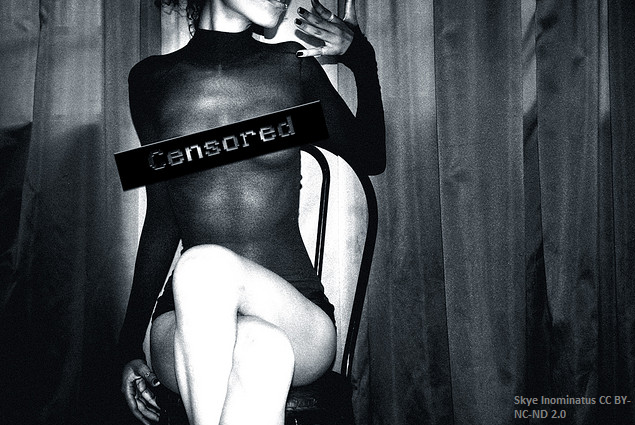Not in my name! The protection of women as a censorship argument
by Digital Rights LAC on October 29, 2014
Beatriz Busaniche, Fundación Vía Libre
Once again, in what seems to be a classic example since the widespread use of the Internet, good intentions justify projects that threaten constitutional rights and guaranties. The bill to remove messages promoting sex trade and human trafficking submitted by Argentina represents a clear example. With the aim of putting an end to human trafficking and sex trade, a bill which is useless for such purpose and dangerous for the freedom is expression is proposed.
The bill, which was signed among other representatives by Andrés Larroque and several other government party legislators under file number 6943-D-2013, obtained favourable opinion by a majority of votes without amendments in the Communications and Computing Commission in the Chamber of Representatives on 26 August this year.
Although the fight against human trafficking in general and sex trade in particular, are legitimate goals, the bill goes further. The articles of the bill provide for a ban on “all announcements, publications, advertisements or any other type of messages promoting sexual offerings or making expressed or implied reference to the request of commercial sex workers, through any media”, including web sites.
Note that in the scope of the definition the ban reaches all “expressed or implied” communications referring to sex offerings, which are not illegal in Argentina. About 6 thousand women, belonging to Asociación de Meretrices Argentinas (AMMAR), make their livelihoods from this type of offerings and claim to be sex workers. 6 out of 10 people who took part in the survey conducted by the Asociación de Travestis, Transexuales y Transgénero de Argentina in 2012 declared themselves to be related to sex work nowadays. This people find themselves in vulnerable situations and this type of legislation places them in a position less protected and secure since it makes them more difficult to offer their services in an autonomous and independent manner, not depending on sexual exploiters the bill intends to pursue.
The bill develops the purpose of the Act regarding “Prevention and Sanction of human trafficking and assistance to victims” (Law No. 26364), since the law does not ban advertisements published by a person of legal age offering sex services, which is in contradiction with argentine constitutional principles stating that “any individual of the Nation shall be forced to do what is not mandated by law, or prevented from doing what it is not prohibited by law”. Such principle of legality is key to the rule of law.
The bill in its second part of article 2 states that “all advertisements making reference to other illicit activities with the purpose of performing any of the activities listed in the previous paragraph are included in this Act”. Such level of prohibition on advertisements and communications regarding legal activities affects Constitutional principles.
The procedure for enforcing the proposed law means that “the implementation and use of sanctions imposed for violating the provisions hereunder shall be made by competent authorities pursuant to regulations issued by the executive branch to that end” (article 5).
Furthermore, Article 6 empowers competent authorities to request elimination and locking of advertisement access, publications, publicity or any other type of message or content listed in article 2 which are spread through the media or information and communication technology, pursuant to the procedure stated by the executive branch. This means that the Act empowers competent authorities to lock contents which may not be illicit and impose fines to the media without court order.
This initiative follows the patterns of another bill submitted by the Senate which governs filters on pornographic websites for adults in general (http://www.infotechnology.com/internet/Presentan-un-proyecto-de-ley-para-facilitar-el-bloqueo-de-sitios-de-Internet-en-la-Argentina-20140714-0002.html). Both bills are committed to noble causes: the fight against human trafficking and sex trade, on the one hand, and the protection of minors, on the other, but both propose restriction, control and censorship systems unfit for the rule of law.
Sexual offering is not always a synonym for sex trade or human trafficking. The fight against such scourge deserves much more than this and requires serious consideration of the actions needed. Data provided by the Office of Argentine’s Public Prosecutor, contained in the minority opinion, state that the influence of the Internet on the catching of human trafficking victims is very low. Only 5% of the recruiting of people for human trafficking networks is attributed to graphic publicity or communication technology (Internet, phone, online chat, etcetera).
The fight against human trafficking, the defense of women dignity and of people in exploitation situations, and the care and protection of children’s rights are undeniable causes. Nevertheless, bills which only relate to the ban of messages and the locking and filtering of the mass and the Internet in order to defend the rights of human trafficking and sexual trade victims, contribute very little to this situation and weaken the difficult situation of autonomous and independent sex workers.
When moral concerns and prejudices rule this discussion, it becomes very hard to publicly express the rejection of bills which are nobly justified but establish extremely serious regulatory precedents.






